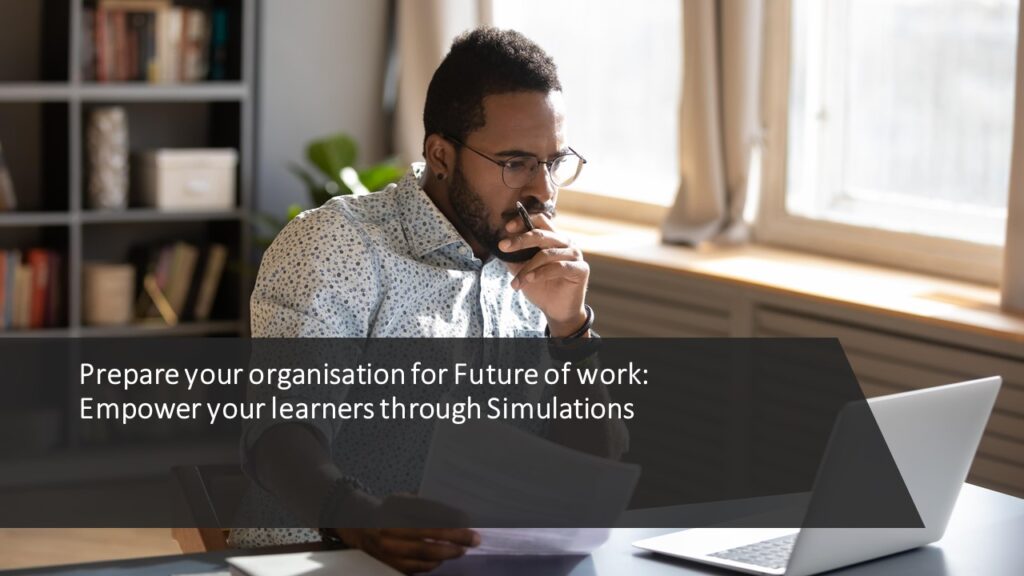The linkage between the future of work and lifelong learning has been emphasized in many studies[i] (ILP and Forbes for example). If lifelong learning is to become a culture in any organisation, there must be voluntary participation from employees. Employers need to invest in creating and sustaining this culture. This does not come easy in traditionally managed organisations. A new paradigm shift is necessary to enable this.
In an earlier article, published by CEO Insights India magazine, (also available here) I had written about the need for organisations to democratize learning and empower learners on what to learn. This is an essential factor for preparing organisations for the future of work. Organisations that have Servant Leadership as an overarching Leadership philosophy stand a much better chance in nurturing this culture.
In this blog, let us look at the how part of empowering learners. How can we effectively empower learners? How can we attract them to the learning opportunities that the organisation is investing in?
One of the most effective ways of doing this, is through Simulations for learning.
 Simulation is not a new subject by any stretch of imagination. The first flight simulator was used for training pilots as early as 1929, almost a century back. Board based simulations were used in corporate trainings often. The advent of eLearning provided a springboard for simulations and rightly so. Simulations became an integral part of blended learning in late nineties or early 2000s. The fact is that they remain an integral part of any learning intervention today and more so in the new normal.
Simulation is not a new subject by any stretch of imagination. The first flight simulator was used for training pilots as early as 1929, almost a century back. Board based simulations were used in corporate trainings often. The advent of eLearning provided a springboard for simulations and rightly so. Simulations became an integral part of blended learning in late nineties or early 2000s. The fact is that they remain an integral part of any learning intervention today and more so in the new normal.
The traditional success of simulations revolved around the below aspects (as highlighted in the book Simulations and the Future of Learning by Clark Aldrich , 2004[ii])
- Authentic and relevant scenarios.
- Applied pressure situations that tap users’ emotions and force them to act.
- A sense of unrestricted options.
- Re-playability
Today we could very well add the availability of simulations over the cloud to this list.
But the most critical aspect that makes simulations perhaps the most accepted component of any corporate learning program is the sense of empowerment it gives the learner. The sense of ownership that the learner has when the learner makes a decision, understands the impact of that decision and is given a chance to rectify or learn from that experience is something that no other form of learning can provide.
While several organisations do allow mistakes in real job situations and let employees consider mistakes as learning opportunities, simulations provide such a learning at a fraction of the cost of making a mistake in real job situations, especially if the job is mission critical. Airline companies would want to ensure that the pilots use simulations before they let them fly passengers. Nuclear power plants would want to ensure that the safety engineers use simulations to understand the impact of unsafe practices.
How about softer aspects like project management or leadership? Our studies reveal that well designed simulations are extremely effective in delivering these types of content as well. Take project management for example. It can be a very dry topic to teach someone in a class room or in a workshop. That is prob ably why many organisations let employees learn project management on-the-job. What if we could make the theories of project management come alive and provide learners with the delight of making decisions and seeing its impact on the project progress? What if a competitive element could be introduced to create a game like atmosphere? What if this could be done over the cloud with multiple teams competing? This is what UST did in partnership with AXL Learn. This partnership between AXL Learn and UST got them Brandon Hall recognitions in 2016 and 2017. On the leadership front when UST wanted to scale up the Servant Leadership education among its associates and leaders they turned to simulations in partnership with Enparadigm. The results have been amazing for these interventions. Not surprisingly, these initiatives went on to be listed in the Gold level in Brandon Hall awards 2021, in Best of Blended Learning category.
ably why many organisations let employees learn project management on-the-job. What if we could make the theories of project management come alive and provide learners with the delight of making decisions and seeing its impact on the project progress? What if a competitive element could be introduced to create a game like atmosphere? What if this could be done over the cloud with multiple teams competing? This is what UST did in partnership with AXL Learn. This partnership between AXL Learn and UST got them Brandon Hall recognitions in 2016 and 2017. On the leadership front when UST wanted to scale up the Servant Leadership education among its associates and leaders they turned to simulations in partnership with Enparadigm. The results have been amazing for these interventions. Not surprisingly, these initiatives went on to be listed in the Gold level in Brandon Hall awards 2021, in Best of Blended Learning category.
Like any other good thing, using Simulations for corporate learning is not without its risks and dangers. At one extreme, it could become laborious and exhausting if the designers incorporate too many possible scenarios in the simulation. On the other extreme, it could become too simple and hence not provide any real learning. The designers must strike a very delicate balance here. The other key aspect that the designers must keep in mind is the quality of content. Great user interface or seamless experience or attractive visuals, are key factors for pure gaming applications. But, when it comes to corporate learning, they are not enough in itself. The content must be cutting edge. That is why the simulation designers must identify and partner with thought leaders on the topic. This is where organisations like Leadyne play a big role. Building a seamless eco system of simulation designers and thought leaders on content is a must for simulations to become the preferred way of learning in the Future of work.
Try out the simulation landscape today. There is much on offer and much more to come.
[i] https://www.forbes.com/sites/emilyhe/2020/09/22/why-learning-is-the-future-of-work/?sh=20bf820c55ac accessed on 7th October 2021, and Shaping skills and lifelong learning for the future of work International Labour Conference 109th Session, 2021, pp 12 and pp 39-41
[ii] Aldrich, Clark. Simulations and the Future of Learning: An Innovative (and Perhaps Revolutionary) Approach to E-Learning. Germany, Wiley, 2003. Pp 9.
________________________________________________________________________________
 Dr. Madana Kumar, PhD is the Servant Leadership Evangelist and Chief Consultant at Leadyne. You can connect with him here or contact him here
Dr. Madana Kumar, PhD is the Servant Leadership Evangelist and Chief Consultant at Leadyne. You can connect with him here or contact him here




Comments are closed.